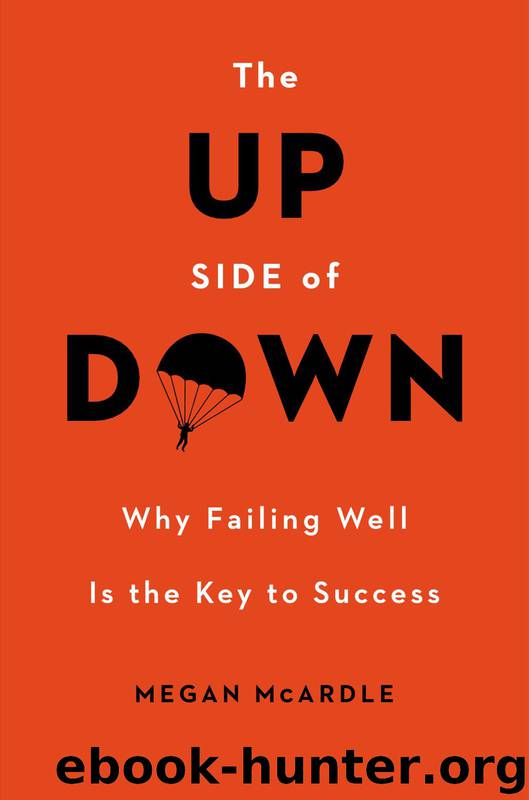The Up Side of Down by Megan McArdle

Author:Megan McArdle [McArdle, Megan]
Language: eng
Format: epub, mobi
Publisher: Penguin Group US
Published: 2014-02-11T05:00:00+00:00
This fall 4,852 freshmen are expected to enroll at UCLA, but only 96, or 2 percent, are African American—the lowest figure in decades and a growing concern at the Westwood campus.
For several years, students, professors and administrators at UCLA have watched with discouragement as the numbers of black students declined. But the new figures, released this week, have . . . prompted school leaders to declare the situation a crisis.
UCLA—which . . . is in a county that is 9.8 percent African American—now has a lower percentage of black freshmen than either crosstown rival USC or UC Berkeley, the school often considered its top competitor within the UC system.
All this information was true—but as Groseclose noted, incomplete. UCLA was getting a lot of minority transfer students, so that overall minority enrollment had actually increased, while changes in NCAA rules, which tightened up the academic requirements for student athletes, had sent enrollment of minority athletes, who generally come in as freshmen, tumbling.
While it’s undoubtedly true that some reporters consciously repress facts that threaten their prior ideological beliefs, I don’t think that’s really the issue in most cases. What bias does—in science, in media, in any situation where information is gathered—is affect what questions you ask. Of course, I don’t know for a fact that the author of that article thinks affirmative action is swell, and Prop 209 was a bad idea, but one gets the strong feeling from the article that this is indeed the case.
If she had been a supporter of Prop 209, she would have looked harder for evidence that things might not be all that dire. And as Groseclose demonstrates in his book, she would have found it.
It’s unlikely that she omitted those facts deliberately. Unless you know a hell of a lot about the California public college system, there is no particular reason why you should ask yourself whether almost half of UCLA undergraduates are transfers rather than incoming freshmen, or whether the NCAA had changed its rules about academic standards for athletes in a way that reduced the number of African American athletes UCLA could admit.
Confirmation bias is a personal weakness: it causes us to support theories that aren’t true, because we don’t ask the right questions. It manifests itself most egregiously when we are most strongly invested. But paradoxically, that same ideological fervor can be a systemic strength. It means that there is always someone who is eager and determined to ask the questions that don’t occur to the rest of us.
We all have an instinctive tendency to accentuate the positive, especially when the alternative is threatening. The key to overcoming this natural tendency is to accept information from outside sources—even, maybe, outside sources who hate you. They’re the only ones who can break through all the motivated reasoning, the cognitive ruts that are all too easy to get into when you’re among a large group of like-minded people. One reason that Ira Glass may have responded so quickly and forthrightly is that his error was exposed by another NPR journalist.
Download
The Up Side of Down by Megan McArdle.epub
The Up Side of Down by Megan McArdle.mobi
This site does not store any files on its server. We only index and link to content provided by other sites. Please contact the content providers to delete copyright contents if any and email us, we'll remove relevant links or contents immediately.
Hit Refresh by Satya Nadella(8381)
The Compound Effect by Darren Hardy(7656)
Change Your Questions, Change Your Life by Marilee Adams(6713)
Nudge - Improving Decisions about Health, Wealth, and Happiness by Thaler Sunstein(6694)
The Black Swan by Nassim Nicholas Taleb(6267)
Daring Greatly by Brene Brown(5705)
Deep Work by Cal Newport(5612)
Principles: Life and Work by Ray Dalio(5399)
Rich Dad Poor Dad by Robert T. Kiyosaki(5224)
The Myth of the Strong Leader by Archie Brown(4827)
Man-made Catastrophes and Risk Information Concealment by Dmitry Chernov & Didier Sornette(4821)
Big Magic: Creative Living Beyond Fear by Elizabeth Gilbert(4788)
The Slight Edge by Jeff Olson(4770)
Digital Minimalism by Cal Newport;(4684)
Discipline Equals Freedom by Jocko Willink(4683)
The Motivation Myth by Jeff Haden(4583)
Stone's Rules by Roger Stone(4464)
Management Strategies for the Cloud Revolution: How Cloud Computing Is Transforming Business and Why You Can't Afford to Be Left Behind by Charles Babcock(4167)
The Doodle Revolution by Sunni Brown(4094)
